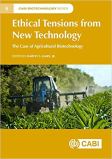 My new book, Ethical Tensions from New Technology: The Case of Agricultural Biotechnology, has just been released. As stated in the back-cover blurb: The introduction of new technologies can be controversial, especially when they create ethical tensions as well as winners and losers among stakeholders and interest groups. While ethical tensions resulting from the genetic modification of crops and plants and their supportive gene technologies have been apparent for decades, persistent challenges remain. This book explores the contemporary nature, type, extent and implications of ethical tensions resulting from agricultural biotechnology specifically and technology generally. There are four main arenas of ethical tensions: public opinion, policy and regulation, technology as solutions to problems, and older versus new technologies. Contributions focus on one or more of these arenas by identifying the ethical tensions technology creates and articulating emerging fault lines and, where possible, viable solutions.
My new book, Ethical Tensions from New Technology: The Case of Agricultural Biotechnology, has just been released. As stated in the back-cover blurb: The introduction of new technologies can be controversial, especially when they create ethical tensions as well as winners and losers among stakeholders and interest groups. While ethical tensions resulting from the genetic modification of crops and plants and their supportive gene technologies have been apparent for decades, persistent challenges remain. This book explores the contemporary nature, type, extent and implications of ethical tensions resulting from agricultural biotechnology specifically and technology generally. There are four main arenas of ethical tensions: public opinion, policy and regulation, technology as solutions to problems, and older versus new technologies. Contributions focus on one or more of these arenas by identifying the ethical tensions technology creates and articulating emerging fault lines and, where possible, viable solutions.
As an edited book, I have solicited contributions from scholars all over the world. Here is the table of contents:
Introduction: Ethical tensions and new technology: An overview in the context of agricultural biotechnology
Part 1: Public opinion and interest
1: Ethical tensions from a “science alone” approach in communicating GE science to consumers, by Jane Kolodinsky (University of Vermont)
2: Against the (GM) grain: ethical tensions and agro-biotechnology activism in the United States, Bradley Martin Jones (Washington University in St. Louis)
3: The use and abuse of the term GMO in the “common weal rhetoric” against the application of modern biotechnology in agriculture, by Philipp Aerni (University of Zurich)
4: Collaborating with the enemy? A view from Down Under on GM research partnerships, by Rachel A. Ankeny (University of Adelaide), Heather J. Bray (University of Adelaide) and Kelly A. McKinley (University of Adelaide)
Part 2: Policy and regulation
5: Three models of public opinion and public interest for agricultural biotechnology: precautionary, conventional, and accommodative, by Duane Windsor (Rice University)
6: Genetically modified organisms in food: ethical tensions and the labeling initiative, by Debra M. Strauss (Fairfield University)
7: Ethical tensions in regulation of agricultural biotechnology and its impact on policy outcomes: evidences from the U.S. and India, by Deepthi E. Kolady (South Dakota State University) and Shivendra Kumar Srivastava (ICAR-National Institute of Agricultural Economics and Policy Research)
Part 3: Technological fix criticism
8: Technological pragmatism: navigating the ethical tensions created by agricultural biotechnology, by Dane Scott (University of Montana)
9: Absolute hogwash: assemblage and the new breed of animal biotechnology, by Katie M. MacDonald (University of Guelph)
Part 4: New versus old technology
10: Nature-identical outcomes, artificial processes: governance of CRISPR/Cas genome editing as an ethical challenge, by Frauke Pirscher (Martin Luther University Halle-Wittenberg), Bartosz Bartkowski (UFZ – Helmholtz Centre for Environmental Research), Insa Theesfeld (Martin Luther University Halle-Wittenberg) and Johannes Timaeus (University of Kassel)
11: New technology, cognitive bias and ethical tensions in entrepreneurial commercialization: the case of CRISPR, by Desmond Ng (Texas A&M University) and Harvey S. James, Jr. (University of Missouri)
Part 5: Mediating ethical tensions
12: New technology, ethical tensions and the mediating role of translational research, by Corinne Valdivia (University of Missouri), Harvey S. James, Jr. (University of Missouri) and Roberto Quiroz (International Potato Center)
Don’t wait to order your copy from the publisher (here), Amazon (here) or wherever fine books are sold.
